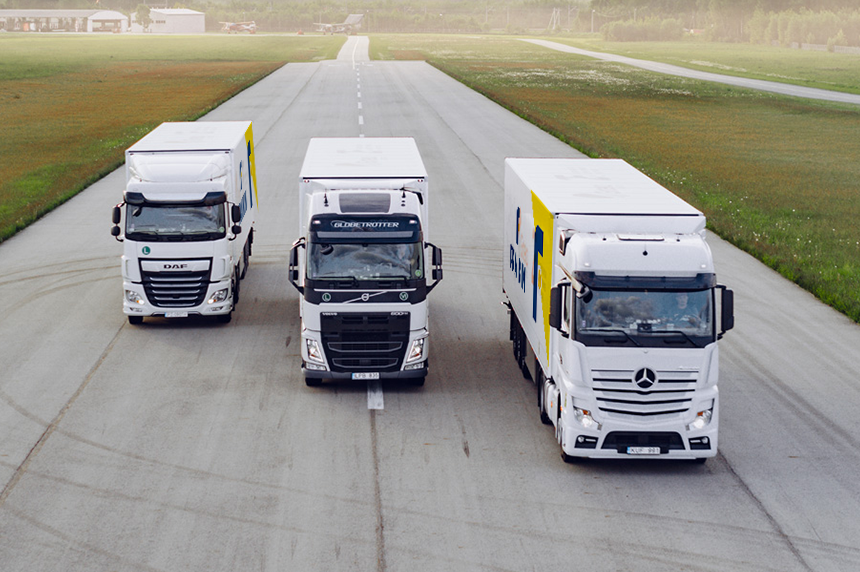10
May
Operational Truck Leasing vs. Capital Truck Leasing
Operational Truck Leasing vs. Capital Truck Leasing: Difference Between Each and How to Choose Between the Two
There are two types of truck leasing: An operational lease and a capital lease. Before leasing a commercial vehicle from a trucking rental company, you should understand the differences between these two options.
Read on to know what is capital lease & operational lease and what’s the difference between each other. At the end of the blog, you can determine the best option for your business.
What is Operational Lease?
An operational truck lease is a leasing arrangement that allows business owners to rent a commercial truck for a predetermined duration. The lease typically includes the use of the commercial truck, as well as maintenance and insurance. However, the lessee is not responsible for the trucks' residual value and can choose to return the commercial vehicle at the end of the lease contract to the trucking company.
Operational truck leases are ideal for businesses that require trucks for a short period, as in 5 years they do not want to be burdened with maintenance and repair costs, or avoid the risks associated with owning commercial vehicles. With this type of truck lease, businesses can get access to the latest truck models with advanced technological features without incurring the costs of ownership.
What is Capital Lease?
Capital truck leasing refers to a financial arrangement whereby a business or an individual leases a truck for a specific period. In this arrangement, the lessee pays a monthly or periodic rental fee to the lessor for the use of the commercial truck.
On the other hand, Capital truck leasing is an alternative option to purchasing a commercial truck outright, which may be beyond the financial abilities of some businesses or individuals. It allows you to use a commercial truck without investing a large amount of money upfront.
However, it’s important to carefully review the terms of a capital truck leasing agreement before entering one, as there may be restrictions on the use of the truck, requirements for insurance coverage, and penalties for early termination of the lease.
Capital & Operational Leases: Identifying Some Biggest Differentiators
Understanding Capital Truck Leasing
A capital lease, also known as a finance lease, is a type of lease agreement where the lessee (the person or company leasing the asset) is treated as the owner of the asset for accounting purposes.
In the case of a vehicle lease, a capital lease would involve the lessee making monthly payments to the vehicle for a fixed term, typically three to five years. At the end of the lease, the user pays monthly instalments for the truck for a fixed duration after which the user becomes the owner. This type of lease is often used by businesses that need to acquire equipment or vehicles but prefer to pay for them overtime rather than in a lump sum. Capital truck leasing can be cost-effective for companies to acquire the use of a commercial truck without having to purchase it outright. Leasing can also provide flexibility, as you can choose to lease a different truck at the end of the lease term if their needs change.
However, it is significant to carefully consider the terms of the truck lease agreement before entering a capital truck lease. Make sure to understand all the costs associated with the lease, including any fees for early termination or excess mileage. Additionally, consider factors such as the anticipated usage of the truck and the expected maintenance costs when deciding whether leasing is the best option for your business.
Understanding Operational Truck Leasing
Operational truck leasing is a type of agreement where a company leases a truck from a leasing company for a specified period of time. The leasing company owns the vehicle and is responsible for maintaining it, while the lessee pays a monthly fee for the use of the truck.
The lessor is typically responsible for covering the costs of insurance, fuel, and any other operational expenses associated with the truck. At the end of the lease term, the lessee can either return the vehicle to the leasing company, extend the lease or based on the market value of the vehicle
Operational truck leasing is a popular option for businesses that need access to trucks for a specific period, without the commitment and expense of purchasing and maintaining their own fleet of vehicles. It allows businesses to focus on their core operations and avoid the upfront capital costs associated with owning and maintaining a truck fleet.
Additionally, operational truck leasing can provide businesses with greater flexibility, as they can easily scale their fleet up or down depending on their needs.
Conclusion
In conclusion, both capital and operational truck leasing options have advantages, and it's essential to research and understand each type before making a decision. One is not inherently better than the other; it depends on your circumstances & what you are looking to accomplish.
Whether it's short-term leases or long-term ownership, understanding your business needs and goals is crucial in selecting the right truck leasing option. With careful consideration and proper planning, a business owner can successfully secure a truck lease that serves their company's specific needs while saving money on vehicle acquisition and maintenance costs.


Comments
1